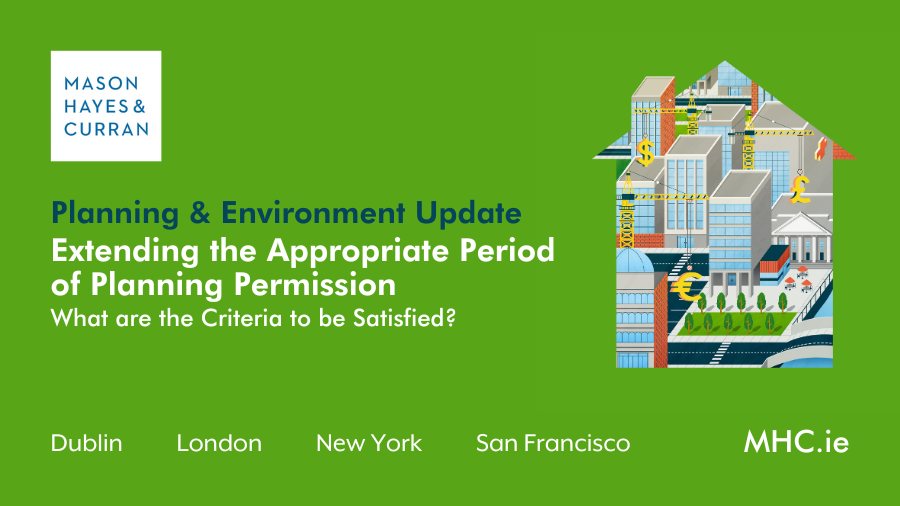Extending the Appropriate Period of Planning Permission
What are the Criteria to be Satisfied?

Background
Ironborn Real Estate Limited (Ironborn) challenged Dun Laoghaire-Rathdown County Council’s (the Council) decision, made under section 42 of the 2000 Act, refusing Ironborn’s application to extend the appropriate period of planning permission granted by An Bord Pleanála (the Board) in 2011.
Section 40 of the 2000 Act provides that a planning permission will cease to be valid on expiry of the “appropriate period”. The default appropriate period of planning permission under the 2000 Act is five years. However, section 41 of the 2000 Act empowers a planning authority or the Board to specify a longer period during which the planning permission will have effect. This means that the appropriate period can be extended up to a maximum of 10 years in the case of a residential development. Section 42 of the 2000 Act provides that an application may be made to the relevant planning authority to extend the appropriate period, ie the period for which the planning permission will continue to be valid. If the criteria in section 42 are satisfied, the planning authority is required to grant the extension.
Ironborn received planning permission for a period of 10 years in December 2011 for its proposed development. It comprised residential, retail and office units as well as community and sports facilities in Stepaside, Dublin 18. Ironborn submitted an application to the Council in December 2021 for an extension of the appropriate period under section 42. The Council issued its decision to refuse the application in September 2022.
Relief sought
Ironborn applied to the High Court seeking judicial review of the decision of the Council to reject the extension application.
The decision
In his decision, Mr Justice Mulcahy summarised two issues at the heart of this dispute as follows:
- Whether the Council erred in its interpretation and application of section 42(8) of the 2000 Act, and
- Whether the Council erred in its interpretation and application of section 42(1)(a)(i)(IV) of the 2000 Act (the Clause IV requirement)
Section 42(8) of the 2000 Act
Section 42(8) of the 2000 Act provides as follows:
“A planning authority shall not extend the appropriate period under this section in relation to a permission if an environmental impact assessment or an appropriate assessment would be required in relation to the proposed
extension concerned.”
The Council interpreted the section as not including an extension to the appropriate period whenever an environmental impact assessment (EIA) or appropriate assessment (AA) would be required for the entire development the subject of the planning permission. It was Ironborn’s contention that section 42(8) only precluded an extension where an EIA or AA would be required for the works remaining to be completed on foot of the planning permission sought to be extended.
Mr Justice Mulcahy considered the rules of statutory interpretation and examined the EU Directives from which the provisions originated. Following this, Mr Justice Mulcahy held that it was not permissible to construe the relevant sections of the 2000 Act as imposing requirements which were not necessitated by the EU law. He deemed that the Court was bound to interpret section 42(8) in a manner that gave effect to EU law to the fullest extent possible:
“[I]n my view, the Council has erred in its interpretation of section 42(8). The assessment required for the purpose of that section is not required to be conducted by reference to the whole of the development the subject matter of the original grant of permission, but rather by reference only to the environmental effects of the development yet to take place which the decision to extend has the potential to authorise together with any additional environmental effects to which the change in completion date may give rise.”[1]
The Clause IV requirement
Section 42(1)(a)(i)(IV) of the 2000 Act provides that:
“On application to it in that behalf, but subject to subsection 8, a planning authority shall, as regards a particular permission, extend the appropriate period by such additional period not exceeding 5 years as the authority considers requisite to enable the development to which the permission relates to be completed provided that each of the following requirements is complied with:
(a)(i) the authority is satisfied that –
. . .
(iv) the development will be completed within a reasonable time.”
In relying on this provision as the basis for its rejection, the Council maintained that it is necessary that an applicant for an extension satisfy the planning authority of its intention to complete the development within a reasonable time. Ironborn argued that the effect of this section was that an applicant need only show that the development was readily capable of being completed within a reasonable time. Ironborn also contended, however, that the Council erred in imposing a requirement that it be satisfied that the works would actually be completed within that time. This was a threshold they considered virtually impossible to satisfy given the inherent uncertainties in carrying out any development.
Regarding the Council’s interpretation of the Clause IV requirement, the Court found that it was reasonable for the Council to conclude that it was not satisfied that the development would be completed within a reasonable time. In particular, the Court rejected Ironborn’s argument that the Council’s interpretation of that section imposed a threshold that was impossible to satisfy, stating:
“It does not require the Council to be certain, or satisfied beyond a reasonable doubt, that it will be completed. In this case, the Council decided the question by reference to whether there was an intention on the part of the developer to complete the development. In the absence of evidence of such an intention, the Council said that it was not satisfied that the development would be completed. The clear inference is that if the Council had been satisfied that the developer intended to complete the development, then, in circumstances where it agreed that the development could be completed within the time sought, it would have concluded that this requirement was met. I think that this was an entirely reasonable approach for it to take.”[2]
The Court accordingly concluded that the Council’s rejection of the application was both legitimate and permissible and that Ironborn’s challenge should be dismissed.
Conclusion
This judgment serves as a reminder that an extension of planning permission will not be granted as of right. An applicant for an extension must satisfy the planning authority of its intention to complete the development within a reasonable time.
For more information and expert advice, contact a member of our Planning & Environment team.
The content of this article is provided for information purposes only and does not constitute legal or other advice.
[1] At paragraph 106 of Justice Mulcahy’s judgment
[2] At paragraph 116 of Justice Mulcahy’s judgment
Share this:





